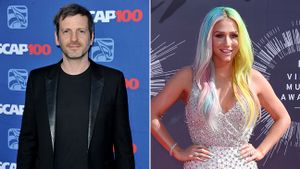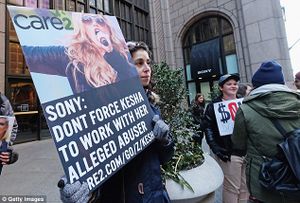GRSJ224/FreeKesha
Background
FreeKesha is a social media campaign that stemmed out of pop-singer Kesha Rose’s legal battle against producer Dr.Luke in which he has been accused of sexual assault and battery, sexual harassment, gender violence, emotional abuse, and violation of California business practices. The aim is to free Kesha from her contractual obligation of recording four more albums with Dr.Luke. The battle has included several law suits in several states and has been on-going since the original law suit was filed in 2014. Dr.Luke’s legal team has dismissed the claims as the singer trying to strengthen her position in contract negotiations.[1]
2014 Lawsuit
The battle began in 2014 when artist Kesha Rose filed a law suit in the state of California. The case cites a wide variety of misconduct on the part of Dr.Luke including sexual assault and emotional abuse. Dr.Luke’s legal team responded by filing a defamation law suit against the artist and her mother, Pebe Sebert.[1]
Sexual Assault
The primary claim of sexual assault comes from an allegation made by Kesha that Luke had raped her in October of 2005, giving her what he called “sober pills” which was actually GHB. The singer claims that with these drugs he was able to get her unconscious and back to his room where he proceeded to rape her. [2]
Emotional Abuse
The allegations of emotional abuse focus largely on Dr.Luke heavily limiting Kesha’s artistic freedom and his attack on her appearance. The star, was admitted into rehab in 2013 for an eating disorder, cites Dr.Luke as a factor in the creation of her illness, saying he pressured her to lose weight, and compared her to a refrigerator. [1]
Video
A key component in the defence of Dr.Luke is a sworn video testimony of Kesha from 2011 in which she states she never drugged or sexually abused by Dr.Luke [1]. Kesha’s legal team has claimed that the statement made in the video is untrue and that was video was captured under conditions of fear, abuse, bullying and rape trauma syndrome.
Dropping the case
In August 2016 the singer announced she would be dropping her case in California in order to focus the on-going case in New York as well as her career and creating music for her fans. It has been reported that she submitted 28 new songs to her record label for approval. This places Kesha in a position of legal power given that if the label does not release the music, they may actually be in breach of contract. This announcement came following an announcement of a small club tour on the east coast, in which she will be performing with a group called “Kesha and the Creepies”. [3]
Public Response
The #FreeKesha campaign has existed since 2013, when a fan created a petition to free Kesha from her contract with Dr.Luke on the ground that she was being stifled artistically by him, given no creative control[4]. The site www.freekesha.com[4] is not only home to a petition, but also to 109 unreleased tracks[4]. Since the law suits, the campaign has grown, with millions of tweets and several online petitions, with one reaching almost half a million signatures.[5] Several other hashtags have stemmed from the movement such as #SonySupportsRape which critiques the company for continuing to work with Kesha’s alleged abuser. Fans have also hosted several protests outside Sony headquarters and bought ad time on Spotify in an attempt to gain public attention and support[1].
Industry Response
In addition to the large outcry of support from fans, several celebrities have also come out in support of Kesha, including Kelly Clarkson, Lorde, Lady Gaga, Ariana Grande, Halsey, Lily Allen, Demi Lavato, Snoop Dogg, and dozens others [6]. She has received major support from Adele, who dedicated her Brit Award to the artist [1], Taylor Swift, who donated $250,000 to help with legal fees[1], and Zedd who both produced a song with Kesha and brought her on stage at his Coachella performance [7].
Injunction
While this case was on-going, Kesha filed an injunction asking for immediate freedom to record and release music without Dr.Luke, citing irrefutable harm to her career if she is remains unable to release music. The injunction Kesha sought would have allowed her to create and release music without Dr.Luke. Kesha was denied her injunction on the grounds that Sony would suffer irreparable harm if she as not complete her contractual obligation. [8]
Reaction
There has been a large public reaction to the denial of the injunction, especially given the reasoning of the judge. Actor George Takei stated he found the ruling an unfortunate and troubling example of favoring corporations over people [9]. This instance can be cited as an occurrence of Rape Culture, as a woman’s personal safety is placed of less importance than the monetary value of her contract.
Importance of the Case
This case has been cited by many as a high profile example of Rape Culture. The case has opened up a larger public conversation about not only sexual assault [10][11][12], but also misogyny in the music industry [11] and the uphill battle faced by rape survivors when seeking justice.[10][11][12]
References
- ↑ 1.0 1.1 1.2 1.3 1.4 1.5 1.6 http://www.rollingstone.com/music/features/kesha-and-dr-luke-everything-you-need-to-know-to-understand-the-case-20160222
- ↑ http://www.dailymail.co.uk/news/article-3486128
- ↑ [3][https://mic.com/articles/150355/kesha-drops-sexual-assault-lawsuit-against-dr-luke-to-focus-on-new-music#.brzayAcfU
- ↑ 4.0 4.1 4.2 http://freekesha.com/
- ↑ [5]http://www.completemusicupdate.com/article/free-kesha-protestors-deliver-400000-signature-petition-to-sony-music/
- ↑ [6]http://www.ew.com/article/2016/02/19/kesha-dr-luke-stars-react
- ↑ [7]http://www.billboard.com/articles/columns/pop/7350251/how-kesha-record-new-single-zedd-legal-battle-dr-luke
- ↑ [8]http://www.nydailynews.com/entertainment/music/kesha-sobs-judge-denies-sony-records-injunction-request-article-1.2537490
- ↑ [9]https://www.facebook.com/georgehtakei/posts/1486334138062701
- ↑ [10]http://www.huffingtonpost.com/entry/kesha-sexual-assault-why-women-dont-come-forward_us_56c77579e4b0928f5a6bcd51
- ↑ [11]http://s.telegraph.co.uk/graphics/projects/free-kesha-sex-abuse-and-the-music-industry/index.html
- ↑ [12]http://eatmorecake.co.uk/freekesha-how-the-odds-are-stacked-against-rape-survivors/

